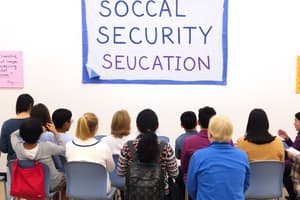Podcast
Questions and Answers
In recent years, there has been increased emphasis on ______ education within the public school system.
In recent years, there has been increased emphasis on ______ education within the public school system.
civics
Several states have implemented requirements for students to pass a U.S. ______ exam prior to graduating high school.
Several states have implemented requirements for students to pass a U.S. ______ exam prior to graduating high school.
citizenship
Effective civics education should involve more than just memorizing facts and ______.
Effective civics education should involve more than just memorizing facts and ______.
procedures
Jennifer Reidel's students participate in the creation and debate of ______, studying Supreme Court cases, and engaging in mock trials.
Jennifer Reidel's students participate in the creation and debate of ______, studying Supreme Court cases, and engaging in mock trials.
A balanced approach that incorporates practical applications of knowledge, real-life experiences, and interactive methods is necessary to foster informed ______.
A balanced approach that incorporates practical applications of knowledge, real-life experiences, and interactive methods is necessary to foster informed ______.
Nancy Peterson's American Government class at Gilbert High School in Iowa allows students to introduce bills related to school colors, flowers, songs, and follow a simulated legislative process before implementing 'laws' until ______.
Nancy Peterson's American Government class at Gilbert High School in Iowa allows students to introduce bills related to school colors, flowers, songs, and follow a simulated legislative process before implementing 'laws' until ______.
Service learning programs allow students to apply their classroom knowledge through community service, with Douglas Oswald's high school civics class at Marion Technical Institute in Florida involving mentoring of younger students to prepare them for simulated congressional ______.
Service learning programs allow students to apply their classroom knowledge through community service, with Douglas Oswald's high school civics class at Marion Technical Institute in Florida involving mentoring of younger students to prepare them for simulated congressional ______.
Extracurricular activities that promote student participation in their schools or communities can further enhance the learning ______.
Extracurricular activities that promote student participation in their schools or communities can further enhance the learning ______.
Public examinations play a crucial role in defining and monitoring standards within an ______ system.
Public examinations play a crucial role in defining and monitoring standards within an ______ system.
Research shows that rising educational capital has led to improved performance among better-educated parents, followed by their ______.
Research shows that rising educational capital has led to improved performance among better-educated parents, followed by their ______.
Flashcards are hidden until you start studying
Study Notes
Social Public Examinations in Education Systems
Introduction
In recent years, there has been increased emphasis on civics education within the public school system, especially in the United States. Several states have implemented requirements for students to pass a U.S. citizenship exam prior to graduating high school. However, placing too much emphasis on rote memorization may not effectively promote critical thinking and debate skills among students, which are essential components of a robust civics education. Instead, a balanced approach that incorporates practical applications of knowledge, real-life experiences, and interactive methods is necessary to foster informed citizens capable of engaging in civic discourse and responsible decision-making.
Civics Education in Practice
Effective civics education should involve more than just memorizing facts and procedures. It should aim to encourage critical thinking and meaningful engagement with various aspects of government, history, and democracy. Jennifer Reidel's students at Lyn den High School in Lynden, Washington, exemplify this approach by participating in the creation and debate of bills, studying Supreme Court cases, engaging in mock trials, volunteering within their communities, and discussing current local and international issues. Nancy Peterson's American Government class at Gilbert High School in Iowa allows students to introduce bills related to school colors, flowers, songs, and follow a simulated legislative process before implementing "laws" until graduation. Service learning programs allow students to apply their classroom knowledge through community service, with Douglas Oswald's high school civics class at Marion Technical Institute in Florida involving mentoring of younger students to prepare them for simulated congressional hearings. Additionally, extracurricular activities that promote student participation in their schools or communities can further enhance the learning experience.
Public Examinations: Balancing Standards and Curriculum
Public examinations play a crucial role in defining and monitoring standards within an education system. As Mike Cresswell argues, examination standards are "socially constructed," meaning that they must be validated by society to maintain legitimacy. Research shows that rising educational capital has led to improved performance among better-educated parents, followed by their children. However, concerns about public examinations include distortion of the curriculum, teaching to the test, grade retention, and early dropout. Nonetheless, these assessments primarily aim to provide policymakers with information on overall levels of learning within an education system.
Conclusion
In conclusion, social public examinations should not solely focus on rote memorization but rather strive to cultivate critical thinking skills, debate abilities, and informed citizenship. By incorporating real-life experiences, interactive methods, and community involvement into civics education, educators can create opportunities for students to develop a deeper understanding of government, U.S. history, and democratic processes. This balanced approach will help ensure that public examinations continue to serve their purpose in selecting students for transition to higher levels while maintaining relevance in shaping future generations of informed, engaged citizens.
Studying That Suits You
Use AI to generate personalized quizzes and flashcards to suit your learning preferences.




